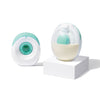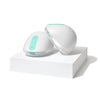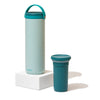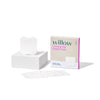If you’ve been searching for a breast pump, you’ve probably come across a ton of options. From traditional pumps to wearable Willow pumps, you may be wondering which one is right for you.
Choosing a pump is never a simple task. With so many pumps on the market, it can be overwhelming. To help you with the decision-making process, we’ve put together a complete comparison of traditional pumps versus Willow pumps. In this guide, you’ll learn some of the features, benefits and differences of each. Let’s dive in!
Traditional Pumps
What Is a Traditional Breast Pump?
Traditional breast pumps include manual, battery-powered and AC-powered pumps. Typically, all of these pumps include several feet of tubing, a motor, plastic valves and a plastic breast shield.
Whether they’re manually powered or electric-powered, conventional pumps create a suction effect on the breast to extract breast milk. Many of these pumps require you to hold the breast shield in place while it extracts your milk.
Are There Different Traditional Pumps?
Traditional, electric-powered breast milk pumps have been around since the 1990s. The motor runs on batteries or AC power, which requires a cord to be plugged into an electrical outlet.
These powered pumps usually feature a control panel, which allows you to adjust and control the degree and pattern of suction. Most types of traditional pumps include clear plastic tubing to connect the motor to the breast shield.
Battery-powered pumps are typically single pumps that allow you to extract milk from only one breast at a time. Most AC-powered pumps come as double pumps, allowing you to extract milk from both breasts simultaneously.
Benefits of Traditional Pumps
As you explore breast milk pump options, it’s important to know the benefits of different pumps. This will help you determine which one is right for you. Here are some key advantages to be aware of when it comes to traditional pumps:
- Unlimited output: Since traditional pumps are connected to a power source, you don’t have to worry about routinely charging them. You either connect them to an outlet or power them with batteries.
- Covered by insurance: Most health insurance plans in the U.S. are required to provide breastfeeding support, which includes coverage for traditional breast pumps. Whether you rent a pump or get a new one, your plan will have guidelines on which types of pumps are covered.
- Access to replacement parts: Traditional pumps are commonly used in hospitals and in homes, with a wide variety available from different manufacturers. This makes it easy to find replacement parts if you need them.
Willow Pumps
What’s the Hype?
One of the most challenging aspects of pumping is the amount of effort involved. First, you have to find a place where you can comfortably pump. If you’re using an AC-powered pump, you have to locate an outlet so you can plug it in.
Then, you have to connect yourself to the pump, often dealing with awkward lines of tubing while holding your breast shield in place. Not to mention that traditional pumps generate loud, whirring noises that can draw unwanted attention and weird looks.
Imagine being able to discreetly pump wherever you need to without all that equipment. Willow pumps make that a reality by removing all the clunkiness from traditional pumps and instead offering a truly innovative design.
With a Willow pump, you won’t have to deal with dangling bottles, electric cords or awkward external tubes. These wearable pumps have everything inside them and tuck right inside your bra, allowing you to pump without being conspicuous.
Benefits of Willow Pumps
-
Hands-Free
Willow pumps give your hands total freedom, thanks to their wearable design. You won’t have to hold up breast shields while you pump or mess with any tubes.
Instead, you can carry on with any number of activities or comfortably hold your baby while you pump. After slipping it into your bra and turning it on, you’re ready to go about your day!
-
Complete Mobility With Leak-Proof Design
One of the most annoying aspects of traditional pumps is you’re confined to the wall where you plug it in. If you have to get up for any reason, you’ll need to pause the entire pumping process.
With a Willow pump, you have total freedom of movement. These portable, wearable pumps have no tubes or cords, giving you 360 degrees of mobility. Plus, they’re leak-proof!
-
High-Performance
One concern about wearable pumps is that they’re not as powerful or efficient as traditional pumps. That’s not true of Willow pumps. Both Willow 3.0® and Willow Go™ provide suction strength comparable to most hospital-grade pumps and double-electric pumps.
-
Adjustable Suction Levels
If you rely on the ability to choose your preferred suction strength with traditional pumps, Willow provides the same advantage.
With Willow 3.0, you can choose among seven levels of adjustable suction for your ultimate comfort level. And with Willow Go, you can select among nine different levels!
-
Quiet and Discreet
Pumping milk is a beautiful process, allowing you to stock up on milk and feed your baby. It’s truly something to enjoy and appreciate.
But connecting to a loud, cumbersome pump is enough to make moms feel more than a little anxious while pumping, and can take the joy out of the experience. Between the whirring noises, the dangling cords and the bulky parts, it’s hard to capture any sense of peace or privacy.
Willow pumps allow you to feel relaxed wherever you’re pumping thanks to their sleek, discreet design. You’re able to pump wherever you are while keeping a low profile. They also pump quietly, giving you a more serene pumping experience.
-
All Levels of Comfort
Pumping should always be comfortable. Willow pumps are designed to be free of any bulky, uncomfortable elements that are commonly seen in traditional pumps. They fit snugly and securely into a supportive bra without any obtrusive tubing.
Willow pumps not only give bodily comfort, they also provide social comfort. Since they’re wearable in your nursing bra, you’re able to pump discreetly in public. This creates a more relaxing way to pump for many moms.
-
App-Connected
Wouldn’t it be great to track your pumping sessions with ease? Enter Willow’s pumping app. This handy app takes the guesswork out of pumping by making it simple to track your output and much more.
With this app, you can track every pumping session, and start, stop and adjust suction. You can even track your output by date, time and side. Plus, this app is compatible with your Apple Watch.
-
Easy to Assemble and Clean
One important aspect of handling your breast pump is making sure it’s properly cleaned and sterilized. If you don’t, you run the risk of bacteria growth in your pump that can make its way into your milk supply.
Because traditional pumps have so many parts, they can often be a pain to clean. Disassembling and reassembling all the tubes and flanges takes a considerable amount of time and elbow grease.
Willow pumps, on the other hand, have only two parts. This makes them quick and easy to disassemble and clean, as well as reassemble them once you’re ready to pump again. Bonus: they’re dishwasher-safe! Talk about simple!
Will My Insurance Cover a Willow Pump?
Even though insurance is required to provide breastfeeding support, insurance providers differ in what kind of pumps they cover. Some women are able to get full or partial reimbursement for their Willow Pump through their insurance.
Before you talk to your insurance provider, learn what questions to ask so you can understand how to obtain coverage for your Willow pump. You can also use our Insurance Verifier to check your insurance coverage and possibly purchase a discounted pump.
If for any reason you can’t get coverage, you can pay for your Willow pump, milk bags and accessories using your FSA or HSA account. Just use your FSA/HSA debit card at checkout, or pay with another credit card and submit your receipt to your plan administrator for reimbursement.
If insurance and an HSA/FSA account aren’t options for you, Willow also provides financing options, such as installment plans.



















